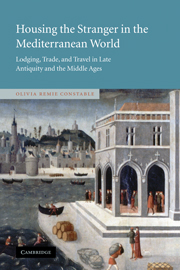 Housing the Stranger in the Mediterranean World
Housing the Stranger in the Mediterranean World Book contents
- Frontmatter
- Contents
- List of illustrations
- List of maps
- Acknowledgments
- Introduction: A culture of travel: words, institutions, and connections
- 1 “Accepting all comers”: a cross-cultural institution in late antiquity
- 2 The transition from Byzantium to the Dār al-Islām
- 3 Commerce, charity, community, and the funduq
- 4 Colonies before colonialism: western Christian trade and the evolution of the fondaco
- 5 Conquest and commercial space: the case of Iberia
- 6 Fondacos in Sicily, south Italy, and the Crusader states
- 7 Changing patterns of Muslim commercial space in the later middle ages
- 8 Christian commerce and the solidification of the fondaco system
- 9 The fondaco in Mediterranean Europe
- Conclusion A changing world: new peoples and institutions in the early modern Mediterranean
- Selected bibliography
- Index
8 - Christian commerce and the solidification of the fondaco system
Published online by Cambridge University Press: 27 August 2009
- Frontmatter
- Contents
- List of illustrations
- List of maps
- Acknowledgments
- Introduction: A culture of travel: words, institutions, and connections
- 1 “Accepting all comers”: a cross-cultural institution in late antiquity
- 2 The transition from Byzantium to the Dār al-Islām
- 3 Commerce, charity, community, and the funduq
- 4 Colonies before colonialism: western Christian trade and the evolution of the fondaco
- 5 Conquest and commercial space: the case of Iberia
- 6 Fondacos in Sicily, south Italy, and the Crusader states
- 7 Changing patterns of Muslim commercial space in the later middle ages
- 8 Christian commerce and the solidification of the fondaco system
- 9 The fondaco in Mediterranean Europe
- Conclusion A changing world: new peoples and institutions in the early modern Mediterranean
- Selected bibliography
- Index
Summary
Throughout the later middle ages, fondacos for European merchants prospered in Muslim port cities alongside a variety of commercial facilities for local traders. Fondacos continued to be a critical factor in negotiating relations between European and Muslim traders, and both Islamic and Christian sources attest to the presence of these western facilities. The progress of cross-Mediterranean trade in the fourteenth and fifteenth centuries cannot be charted as a simple rising curve, however. Intermittent war, piracy, religious censure of interaction, and diplomatic breakdowns, together with other international and local events, produced a more jagged profile. The numbers of western merchants doing business in Muslim ports could vary significantly from year to year, as could the volume of their trade. Yet despite fluctuations in business traffic through individual facilities or in particular regions, the fondaco system survived and flourished into the sixteenth century. At the same time, the older form of the funduq was becoming less common, especially in Mamlūk cities. Indeed, the solidification of the fondaco system for mediating Christian–Muslim commercial affairs in the Maghrib, Egypt, and Syria may have contributed to the decline of its parent institution. This chapter will examine the reasons for the continuing success of the fondaco in the late middle ages, and consider its role as a facilitator of cross-cultural trade in the Mediterranean until the early Ottoman period.
In many ways, late medieval fondacos were very similar in form and function to their earlier counterparts in the twelfth and thirteenth centuries.
- Type
- Chapter
- Information
- Housing the Stranger in the Mediterranean WorldLodging, Trade, and Travel in Late Antiquity and the Middle Ages, pp. 266 - 305Publisher: Cambridge University PressPrint publication year: 2004
